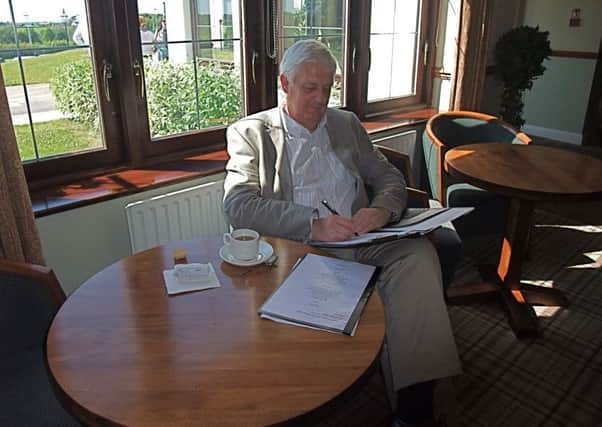Book review: In Case Of Any News, by Kenneth Roy


The book, 49,000 words of it, was written on his laptop in the last five weeks of his life, in pain and discomfort, an extraordinary feat. It is partly an account of the progress of the cancer and of the care, kindness and love he received from doctors, nurses, auxiliaries and cleaners, a tribute to the NHS; partly reminiscences, thoughts on Scottish culture and life, and unavoidably reflections on death. Here, quoting Boswell’s description of his visit to the dying David Hume – which he admires as a fine journalistic scoop – he agrees with the philosopher: no life after death, and no reason to be disturbed by the thought.
Roy was a very fine journalist and broadcaster, an unusual one in that he was only briefly on the staff of any paper. Indeed, he started in journalism on the day he left school, aged 15, working on his local newspaper. He esteemed local journalism as it used to be and recognised its importance in small town Scotland. He preferred life in a small town to life in the city, and this was one reason why he always seemed to have such a good understanding of Scotland and its people. He knew and valued a Scotland that didn’t get much attention from the national media. Historians will find the columns of the magazine Scottish Review which he founded in 1995 and ran on a shoestring, a store of rich material.
Advertisement
Hide AdHe thought Scotland a good place but one with many dark corners which could scarcely bear, but nevertheless demanded, looking into. His memories here of his first two years at Denny High School are grim. Anyone who deplores what is now called child-centred schooling should read them to learn how brutal the old highly-esteemed Scottish education could be. On the other hand he deplored, and was saddened by, what he perceived, rightly, as the emptiness of much that passes for culture today and the erosion of intellectual seriousness and the spirit of enquiry. Read, published here as an Appendix, his piece entitled “The Inveramsay Lecture,” originally delivered to the Institute of Contemporary Scotland, a charity he founded, in which he asserts “non-conformity matters.” Roy had many messages, none more important than the advice: think for yourself. He always did, being shy of received opinion and second-hand ideas.
Approaching the end, he remembers that his friend and fellow journalist, Ian Jack noted that he “hid in provincial obscurity and wasn’t much noticed.” Quite so, he says, “I liked it that way. It suited my temperament.” This is a bit self-deprecating, but I suspect he was always ready to judge himself sharply, with less indulgence than he granted to others. Magnus Linklater, in his introduction to this book, writes that he “always thought of Kenneth Roy as the conscience of Scotland – a writer who gave the nation a wee nudge when he thought it had strayed off course.” Read this book, which is wise, brave and often funny, and you will understand why Linklater thought that. There’s no anger in it, no railing at the malignity of fate, which is cutting him off at 73; instead there is humour and acceptance for the love and friendship he has known and the care and kindness he has received in his last days. We might all want to go with the serenity he achieved. Allan Massie
In Case Of Any News, by Kenneth Roy, ICS Books, 190pp, £14.99